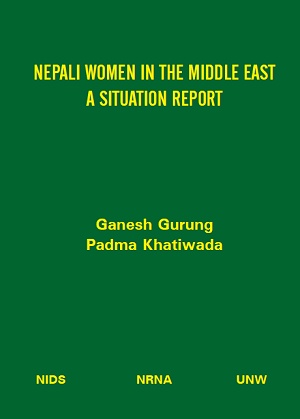A situation Report on ''Nepali women in the Middle East-2013'' has been jointly published by Nepal Institute of Development Studies and Non Resident Nepalese Association with support of UN Women and European Commission. The study has extracted the factors and facts related to women migrant workers. The study has been conducted in the four major destinations of women migrant workers namely Saudi Arabia, Kuwait, UAE and Lebanon. The report shows that currently 1,174,154 women migrant workers are working in gulf countries and 46,764 women are only in Lebanon. Similarly, 28,000 undocumented Nepali women migrants are in Kuwait only. Few findings and recommendation of the study are as follows:-
Findings:
- Over 50 percent of the women migrants in all four destination countries were married.
- 42.5 percent of WMWs in Saudi Arabia were illiterate however 19.2 percent of WMWs in Lebanon held bachelor's degree
- Average number of work hours per day was 15
- Largely employed in informal sector and were aware about the nature of their work before arrival at destination countries
- Highest rate of interest for loan was 36 percent
- The study also highlights various forms of abuses and violence: 29.3 percent of the respondents in Saudi Arabia were physically abused and five percent sexually abused; 54.4 percent of the respondents in Lebanon were physically abused and five percent sexually abused
- All the respondents had feeling that the respective embassies should protect them.
Recommendation:
- Strict mechanism for controlling cheating and corruption while issuing passports, citizenship, payment to agencies
- No correlation between the skill in hand of the migrant workers and nature of jobs they are engaged in: Many respondents from all the four countries are found involved in the jobs they didn’t know or had any idea about them. Skill development trainings program in Nepal needs to be practical and specific.
- Unemployment in Nepal needs to be addressed with focus on cooperative, entrepreneurship and productive sector like agriculture
- Physical violence against women needs to be addressed through coordinated efforts of government, embassy, NRNA and NGO sectors.
- A separate package should be developed for WMWs with inclusion of training, orientation, basic survival language, informed choices, loan from financial institutions, insurance, link up with Nepali embassies/consulates and self employment schemes.

